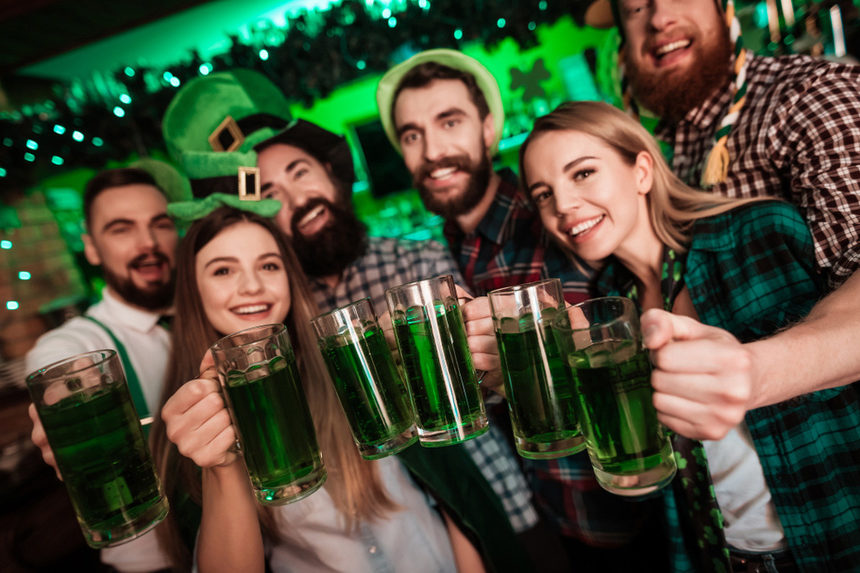Managing editor and logophile Andy Hollandbeck reveals the sometimes surprising roots of common English words and phrases. Remember: Etymology tells us where a word comes from, but not what it means today.
It’s no feat of mystical divination to predict that a lot of people will find themselves intoxicated this weekend, many of them on green beer. St. Patrick’s Day is this Sunday, and many will use the commemoration of the Irish saint — whether they are Irish or not — as an excuse to lift a pint or nine.
But while Catholicism gave us St. Patrick, and Irish Americans honed his feast day to the celebration it is now, the intoxication that results from that celebration comes, at least etymologically, from warring Greeks.
The ancient Greek archer’s tool of war was the toxon, a word for both bow and arrow. To make their weapon deadlier, archers dipped their arrow tips in poison. Toxikon was the word for a poison-tipped arrow, but over time, the word came to refer to the poison itself. By the time the word was adopted into Latin as toxicum, it had shrugged off its ballistic origins and just meant “poison.”
Fast-forwarding through the Middle Ages, the word entered French and eventually evolved, in the 17th century, into the English word toxic. But while this word was wending its way through lexical evolution, English wasn’t just sitting around waiting to get poisoned. Surprisingly, the word intoxicate appears in English written records a century before toxic does. English speakers, it seems, sought a larger vocabulary for getting drunk than for ingesting toxins.
Perhaps unsurprisingly, Shakespeare used intoxicate (though he certainly didn’t invent the word), in The Life of King Henry V (Act IV, Scene vii), believed to have been written in 1599:
Alexander, … in his rages, and all his furies, and his wraths, and his cholers, and his moods, and his displeasures, and his indignations, and also being a little intoxicates in his prains, did, in his ales and his angers, look you, kill his pest friend, Cleitus.
[Captain Fluellen, the Welshman who provides much if this play’s comic relief, often pronounces his bs as ps, so prains and pest are brains and best deliberately mispronounced for effect.]
The verb intoxicate and its adjective form, intoxicated, derive from the Latin intoxicare “to poison,” which itself traces back to the same Greek toxon. There is some evidence that intoxicate, in its earliest use, literally meant “to poison,” but it didn’t take long before the more metaphorical meaning “to make drunk” took hold.
So if you are among the imbibers during this weekend’s St. Patrick’s Day celebrations, relish in the etymological poignancy of that old bartender’s question, “What’s your poison?” And if you’re doing shots of good Irish whiskey, take a moment to remember the type of shots Greek archers took centuries ago that ultimately led to your ability to become intoxicated.
Featured image: Shutterstock
Become a Saturday Evening Post member and enjoy unlimited access. Subscribe now




Comments
So now I know the Greek connection of ‘toxon’ the much later ‘toxicum’, then later ‘toxic’ before ‘intoxicated’. It seems the words ‘intoxicate’ and ‘intoxicated’ have long (and permanent) legs as the nicer and more technical term for being drunk.
Actually the word you used at the top (knackered) is new to me. I’m familiar with the variation (?) ‘shnockered’, ‘plastered’, ‘hammered’ and the ugly ‘$***-faced’. Not sure why I never hear “three sheets to the wind” anymore. I like shnockered the best; it’s so Yiddish. Such great ‘seasoning words’ Americans should embrace Andy. I know I love them. 🙂
Liquor not so much. It was fun for awhile in high school with Boone’s Farm Apple Wine and Annie Green Springs, but that was it until a decade later. In the mid-80’s there were those lunches with Kamikazes making the work afternoon float by more pleasantly until I just stopped it, never to drink again. No more going to The Jolly Roger, Fuddrucker’s or Flakey Jakes. Long gone anyway, with other great restaurants of that completely bygone era.
Drink responsibly this St. Patrick’s Day (if you do), and that includes being ‘buzzed’. In California it’s a $10,000.00 ticket and jail time per the freeway warning signs. Buzzed driving IS drunk driving.